

Asia's Psychology Blog. Emotional Intelligence-the Biology of Behavior. Why Emotional Intelligence?
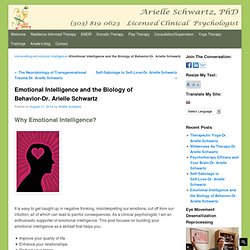
Emotional Intelligence University. Emotional Intelligence. Mind Network » A network for philosophy of mind and cognitive science. All In The Mind. 'The Temporal Prison' - Hull Philosophy Club (Hull, England) The Neuroscience of Organisational Change - Neuroscience and Psychology of H&S. What Makes an ‘Extreme Learner’? Why Great Minds Can't Grasp Consciousness. At a physics meeting last October, Nobel laureate David Gross outlined 25 questions in science that he thought physics might help answer.
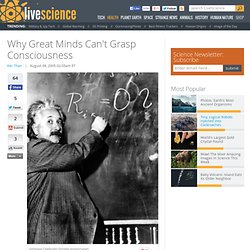
Nestled among queries about black holes and the nature of dark matter and dark energy were questions that wandered beyond the traditional bounds of physics to venture into areas typically associated with the life sciences. One of the Gross's questions involved human consciousness. He wondered whether scientists would ever be able to measure the onset consciousness in infants and speculated that consciousness might be similar to what physicists call a "phase transition," an abrupt and sudden large-scale transformation resulting from several microscopic changes.
Brisbane Ions (BrisIONS) 8 Mistakes Our Brains Make Every Day And How To Prevent Them. 12.3K Flares Filament.io 12.3K Flares ×
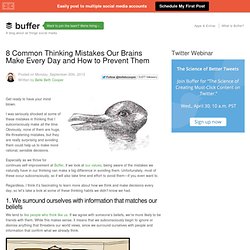
Predicting the unpredictable: critical analysis and practical implications of predictive anticipatory activity. 1Department of Psychology, Northwestern University, Evanston, IL, USA2Dipartimento di Psicologia Generale, Universita di Padova, Padova, Italy3Department of Statistics, University of California at Irvine, Irvine, CA, USA4Samueli Institute, Alexandria, VA, USA5Consciousness Research Laboratory, Institute of Noetic Sciences, Petaluma, CA, USA A recent meta-analysis of experiments from seven independent laboratories (n = 26) indicates that the human body can apparently detect randomly delivered stimuli occurring 1–10 s in the future (Mossbridge et al., 2012).
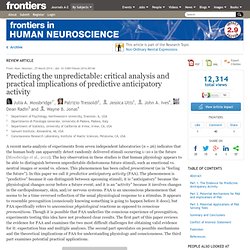
Computer simulating 13-year-old boy becomes first to pass Turing test. Codebreaker Alan Turing devised a test in 1950, saying that if a machine was indistinguishable from a human, then it was 'thinking'.
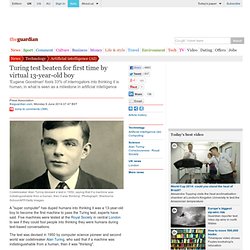
Photograph: Sherborne School/AFP/Getty Images A "super computer" has duped humans into thinking it was a 13-year-old boy to become the first machine to pass the Turing test, experts have said. Five machines were tested at the Royal Society in central London to see if they could fool people into thinking they were humans during text-based conversations. The test was devised in 1950 by computer science pioneer and second world war codebreaker Alan Turing, who said that if a machine was indistinguishable from a human, then it was "thinking". No computer had ever previously passed the Turing test, which requires 30% of human interrogators to be duped during a series of five-minute keyboard conversations, organisers from the University of Reading said.
The 75-Year Study That Found The Secrets To A Fulfilling Life. What if there was a study dedicated to unearthing the secrets to a happy and purposeful life?

It would have to be conducted over the course of many decades, following the lives of real people from childhood until old age, in order to see how they changed and what they learned. And it would probably be too ambitious for anyone to actually undertake. Success Gets into Your Head—and Changes It. Neuroscientists have long understood that the brain can rewire itself in response to experience—a phenomenon known as neuroplasticity.
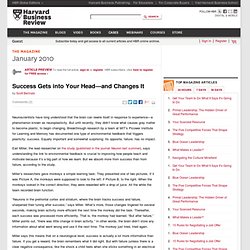
But until recently, they didn’t know what causes gray matter to become plastic, to begin changing. Breakthrough research by a team at MIT’s Picower Institute for Learning and Memory has documented one type of environmental feedback that triggers plasticity: success. Equally important and somewhat surprising: Its opposite, failure, has no impact. Earl Miller, the lead researcher on the study (published in the journal Neuron last summer), says understanding the link to environmental feedback is crucial to improving how people teach and motivate because it’s a big part of how we learn. But we absorb more from success than from failure, according to the study. Search Results - page 1. The Pros & Cons of Empathy: Measuring a Balanced... Tickets.
Invalid quantity.
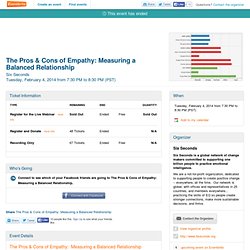
Please enter a quantity of 1 or more. The quantity you chose exceeds the quantity available. Please enter your name. Please enter an email address. Please enter a valid email address. Please enter your message or comments. Helping Children Cultivate their Dreams and Desires Tickets. Invalid quantity.
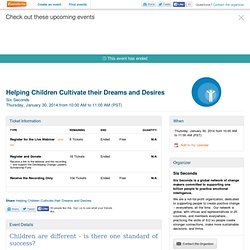
Please enter a quantity of 1 or more. The quantity you chose exceeds the quantity available. Please enter your name. Please enter an email address. Please enter a valid email address. Please enter your message or comments. Please enter the code as shown on the image. Please select the date you would like to attend. Please enter a valid email address in the To: field. Please enter a subject for your message. Please enter a message. Don’t let your brain boss you around. Posted on November 28, 2013.
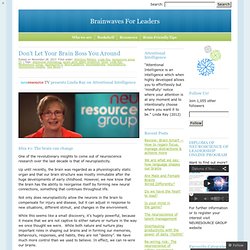
Filed under: Attention Matters, Linda Ray, neuresource group TV | Tags: attentional intelligence, bright shiny object syndrome, focus, Linda Ray, NeuResource Group, neuresourceTV, NeuroCapability, neuroleadership, neuroplasticity, neuroscience insights, Tara Neven | neuresource TV presents Linda Ray on Attentional Intelligence Idea #1: The brain can change.
Cognitive Computing Lab. Gilbert Ryle. 1. The Concept of Mind. Ryle's argument[edit] In the chapter "Descartes' Myth," Ryle introduces the term "the dogma of the Ghost in the machine" to describe the philosophical concept of the mind as an entity separate from the body. He argues "I hope to prove that it is entirely false, and false not in detail but in principle. The brain mechanism behind your inner voice. Corollary discharge plays a central role in our motor system. It allows us to correct motor errors before we have committed them and it allows us to prevent confusion between self- and externally-caused sensory events. Dr Mark Scott. Researchers Harness Brain Game Data. The activities of cognitive training enthusiasts give insight into the effects of lifestyle choices and age on the brain’s performance.
FLICKR, HEY PAUL STUDIOSScientists from California’s Lumos Labs, maker of Web-based brain training games, are gathering data from online users to make connections between cognitive performance, lifestyle choices, and aging, according to a paper published last week (June 20) in Frontiers in Human Neuroscience. For tasks testing memory and arithmetic skills—each completed by around 127,000 to 162,000 users who took a lifestyle survey—the researchers found that high performance correlated with drinking one or two alcoholic beverages per day and sleeping around 7 hours a night.
The researchers also analyzed data from the subset of users who completed individual tasks at least 25 times, in order to measure the relationship between learning ability and age. Quote of the Day: Justifying Digital Schizophrenia. Digital avatars may help treat schizophrenia. A digital avatar therapy could help treat schizophrenia by controlling the voices patients hear inside their heads while hallucinating, scientists say. The computer-based system being developed at the University College London (UCL) in the UK could provide quick and effective therapy that is far more successful than current pharmaceutical treatments, helping to reduce the frequency and severity of episodes of schizophrenia.
In an early pilot of this approach involving 16 patients and up to seven, 30 minute sessions of therapy, almost all of the patients reported an improvement in the frequency and severity of the voices that they hear. Daniel A. Bochner, Ph.D. - From Id to Family System or The Id is the Engine in the Great Life Machine. Visual Consciousness Emerges. A new study of brain activity patterns suggests that babies as young as 5 months old have the neural mechanisms to register that they’ve seen a face. SOFIE GELSKOV The distinctive brain activity pattern associated with visual consciousness in adults is present in babies as young as 5 months old, according to a study published last week (April 18) in Science .
A Common Path to Unconsciousness. Analyses of brain activity patterns show that different drugs induce anesthesia via a common neural mechanism. Consciousness After Death: Strange Tales From the Frontiers of Resuscitation Medicine. Sam Parnia practices resuscitation medicine. Gorillas Agree: Human Frontal Cortex is Nothing Special. Centre for the Mind - Publications. Kurzweil Accelerating Intelligence. The Problem With How We Treat Bipolar Disorder. Red Brick. Embodied Cognition is Not What you Think it is. Introduction The most exciting idea in cognitive science right now is the theory that cognition is embodied.
Essays about the work of Ken Wilber. Research Blog. About. There is no human editor behind e! Documentary- Reality and the Extended Mind (1 of 2) MIT's Luminoso Claims It's Cracked the Code on Text Mining. Tulpa.Info. The Marketplace in Your Brain - The Chronicle Review. Give Me a Sign: What Do Things Mean on the Semantic Web? Adaptive Agents Laboratory, University of Washington, Tacoma.
Portal:Thinking. Complexity and Emergence. Mind, Brain, and the Experimental Psychology of Consciousness. Www.neurophenomenology.com. CCT Map 1-Is the brain a computer? Can Computers Think? FAQ 7 - Logical and Neurological Levels. Evidence: How Do We Know What We Know? Psychology Resources on the Internet. Dualism, by Lisa Storrs. Blair pox project. Technological telepathy: brain-to-brain communication between rats achieved. IBM supercomputer used to simulate a typical human brain. Your Brain on Google: Patterns of Cerebral Activation during... : American Journal of Geriatric Psych. The 12 cognitive biases that prevent you from being rational. +kenwilber.com - blog. In search of self - Nature Neuroscience. Humanism. 12 Around 1 Geometry. Signs of the Singularity. Epistemology of Perception, The Cognitive Psychology and Cognitive Neuroscience/Memory.
Memory. How Friends Ruin Memory: The Social Conformity Effect. The Forgetting Pill Erases Painful Memories Forever. Hyperthymesia. Working memory. Consciousness. It’s Elementary. Stage 5: The Old Soul « Personality & Spirituality. Einstein’s Brain: New Insights into the Roots of Genius. Dualism (philosophy of mind) The Matrix (1999) - Memorable quotes. Frank Rosenblatt. Genes to Cognition Online. Professor Janet Wiles - UQ reSEARCHers (Publications) NLP - help or hype? Investigating the uses of neuro-linguistic programming in management learning. Free NLP eBook. Be All That You Can Be: Enhancing Human Performance - Druckman - 2006 - Journal of Applied Social Psychology.
Neuro-linguistic programming. Seven Tricks Your Mind Plays on You (and How to Fight Back) Definitions of Semiotic Terms. Ervin László. Integral theory. Business needs to learn to see separate challenges as part of the whole. NATURAL BORN CYBORGS?